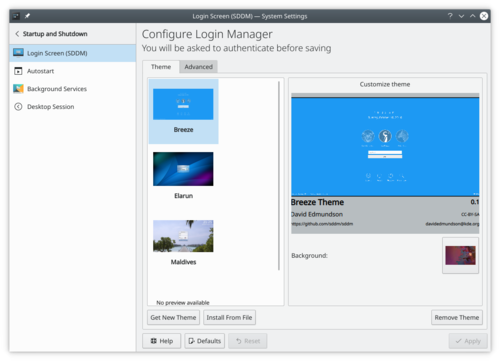System Settings/Login Screen/nl: Difference between revisions
Appearance
Wind-rider (talk | contribs) No edit summary |
Updating to match new version of source page |
||
| (2 intermediate revisions by the same user not shown) | |||
| Line 1: | Line 1: | ||
<languages /> | <languages /> | ||
[[File:Settings-login-screen.png|500px|center|Settings for the login screen]] | |||
This settings module allows you to configure the login procedure. This setting is only useful if you use SDDM as your login manager. Luckily most of the Linux distribution shipping a KDE edition are using SDDM as a login manager. In case you use an other login manager and want to change to SDDM, refer to your distribution wiki. | |||
== Convenience== | |||
< | If you don't want to type your username and password during login, you can check in the tab <menuchoice>Advanced</menuchoice> the <menuchoice>Enable Auto-login</menuchoice> box here, then select the user and default desktop environment you want to auto-login with, and hit <menuchoice>Apply</menuchoice>. Remember, though, that anyone who can physically access your computer or laptop will also have instant access to all your data. You need to make a risk assessment before using this facility. | ||
</ | |||
==More Information== | |||
* [https://en.wikipedia.org/wiki/Simple_Desktop_Display_Manager SDDM] (Wikipedia) | |||
[[ | * [https://wiki.archlinux.org/index.php/SDDM SDDM] (Arch Linux wiki) | ||
[[Category: | * [https://en.wikipedia.org/wiki/Login_manager Login Manager] (Wikipedia) | ||
[[Category: | * [https://wiki.archlinux.org/index.php/Display_manager Login Manager] (Arch Linux wiki) | ||
[[Category:Desktop]] | |||
[[Category:System]] | |||
[[Category:Configuration]] | |||
Latest revision as of 06:00, 23 January 2019

This settings module allows you to configure the login procedure. This setting is only useful if you use SDDM as your login manager. Luckily most of the Linux distribution shipping a KDE edition are using SDDM as a login manager. In case you use an other login manager and want to change to SDDM, refer to your distribution wiki.
Convenience
If you don't want to type your username and password during login, you can check in the tab the box here, then select the user and default desktop environment you want to auto-login with, and hit . Remember, though, that anyone who can physically access your computer or laptop will also have instant access to all your data. You need to make a risk assessment before using this facility.
More Information
- SDDM (Wikipedia)
- SDDM (Arch Linux wiki)
- Login Manager (Wikipedia)
- Login Manager (Arch Linux wiki)
